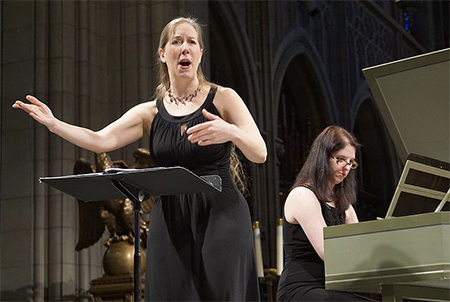by David Kulma

There is a frisson between its artistic directors that makes Burning River Baroque’s concerts fascinating. Paula Maust is an unflappable harpsichordist who plays with vibrancy, elegance, and studied restraint, while soprano Malina Rauschenfels is bountifully theatrical and unpredictable amidst her excellent direction and fioritura. Their excellent guest artists for this concert were Baroque violinists Sarah Elizabeth Cranor and Reynaldo Patiño and Baroque cellist Jessica Korotkin.
The opening Nisi Dominus by Johann Rosenmüller, a German who escaped to Italy after being imprisoned for homosexuality, was both a dramatic setting of Psalm 127 and an object lesson in tone painting. The extended beauty ravished on the word blessed (beatus) was almost mystical, while the ensemble reached a full, glowing glory in the ending “Gloria Patri.”
Maust followed with two solo works by Peter Philips, who was imprisoned as a Catholic in Anglican England, then later fled to the Spanish Netherlands. Pavana and Galliarda Dolorosa are fine examples of English keyboard music of the time — full of melodic filigree and surprising harmonic twists. Maust played this music of fidgety dignity with controlled virtuosity.
The Italian Evaristo Felice Dall’Abaco followed his war-defeated Bavarian employer in flight around Europe. His Trio Sonata in A, Op. 3 showed off the beauteous sounds of Baroque instruments in five short dance-inflected movements. Cranor and Patiño were vivacious and sprightly as they passed ideas back and forth. Korotkin played with a smooth lightness, and Maust gave this sunny music tasteful elaborations.
Handel’s cantata Agrippina condotta a morire featured Rauschenfels at her best. Agrippina, a conniving Roman empress has been banished by her son, the Emperor Nero. Through sixteen sections, Handel shows her torment as she both condemns and defends her son. Rauschenfels’ portrayal was musically engaging, emotionally direct, and worthy of the stage. Her Agrippina was gripped by anger and sorrow. She screamed at the heavens, but also with a nod of her head guaranteed that the constant changes from recitative to aria and arioso were absolutely together.
Rauschenfels’ ability to express three emotions during one held note was staggering. She started slowly without vibrato, crescendoed as the character perceived a problem, then moved to a fast vibrato and shifted to a full angry tone that slammed into the next florid burst of rage. Her ability to turn notation on a page into fully realized human emotion was a feat of the imagination.
After this rush of passion, the concert ended with two bouncing miniatures. Rosenmüller’s Das ist meine Freude on a section from Psalm 73 was joyful, while their encore — the sephardic tune La Comida La Mañana, in recognition of the expulsion of Jews from Spain — brought this compelling concert celebrating exiles to a snappy close.
Published on ClevelandClassical.com March 27, 2018.
Click here for a printable copy of this article


